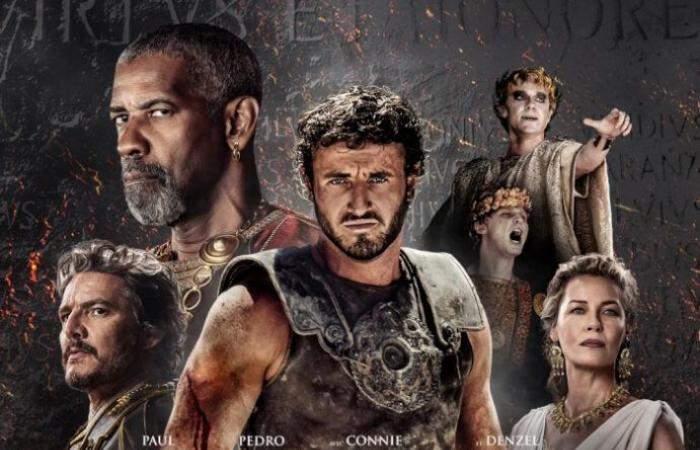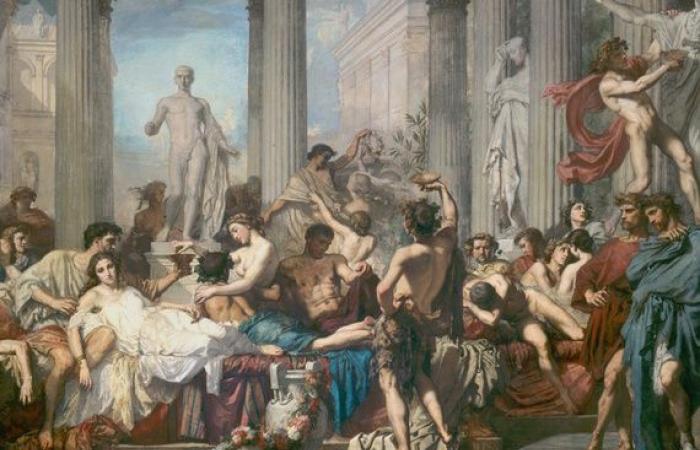November 13, 2024. Ridley Scott returns to the screen with, a quarter of a century later, a sequel to his magnificent epic Gladiator. Ce Gladiator II will please fans of battles and great spectacle and, unsurprisingly, will arouse the skepticism of historians. What is new is that it also implicitly offers us a vision of contemporary America as the director perceives it: overpowering, hated, unequal, arrogant and seductive as hell…
British director Ridley Scott has become one of the stars of Hollywood with so many masterpieces (Alien, Gladiator, Kingdom of Heaven,…) than turnips (1492, The last duel, Napoleon,…). At 86 years old, here he is giving a sequel to Gladiator to meet the unbearable wait of Maximus (Russel Crowe) fans.
The result is a flamboyant 2h30 film with battles and fights you name it.
Gladiator was supposed to take place in 180 AD, at the end of the reign of Marcus Aurelius (the “wise man on the edge of the precipice”) and under that of his son, the poorly named Commodus.
After the assassination of Commodus by his mistress Marcia in 192, then the very brief reign (87 days) of the wise Pertinax, liquidated by the praetorian guard, the legions brought general Septimius Severus to the head of the empire. When he died in 211, he was succeeded together by his two sons Geta (22 years old) and Caracalla (25 years old). The following year, the latter got rid of his younger brother.
It is in this year 212 that the action of Gladiator 2nineteen years after the death of Commodus and that of the gladiator Maximus (fictional hero of Gladiator 1).
To tell the truth, the chronology takes a hit from the first images. It is the Roman fleet which attacks the Numidia of King Jugurtha. Impressive battle scenes except for the fact that the submission of Numidia took place three centuries earlier and ended in 105 BC. BC with the capture of the Numidian king Jugurtha by the troops of Marius!
From the reign of Marcus Aurelius, at the end of the 2nd century, it should be noted, Rome only waged defensive wars on its borders and no longer claimed to extend its possessions. It is true that it reached the known limits of the civilized world everywhere, except on the border with the Parthians, in Mesopotamia (present-day Iraq).
For the rest, the fights in the arena with phantasmagorical animals take us back to Jurassic Park. As for the palace scenes, they evoke the Romans of decadence as depicted by Thomas Couture in the mid-19th century much more than the imperial Rome glimpsed by archaeologists. There is no doubt that the director drew his inspiration from a frequent visit to the Musée d’Orsay (Paris)…
« Make Roma Great Again ! »
Failing to present ancient Rome in its historical truth, Ridley Scott tells us about… the America of Donald Trump!
The images of the City and its people as well as the reflections of the characters are transparent allusions to the new Rome: imperial and overpowering, hated outside its borders and corrupted within by social injustice and arrogance. powerful ones.
The oligarchy in power maintains itself by force-feeding the plebs violent games and repressing them whenever necessary. The riots at the foot of the Colosseum, in favor of the gladiator Hanno-Lucius, are in some ways reminiscent of the assault on the Capitol in January 2021.
Multiculturalism is also very present here. Ridley Scott’s Rome is not a Mediterranean city but a cosmopolitan metropolis like New York or London today.
The doctor who treats the hero Hanno-Lucius says he was born in Benares, India. Kidnapped as a slave and become a gladiator, he obtained his freedom and was able to marry a woman from Brittany: ” Today, he said proudly to the gladiator, we speak Latin at home with our children; These are real Roman citizens and they have blue eyes like yours! »
As for the hero, he dwells on his ambition to resurrect the “Roman Dream” (Roman dream in the text). In his mind, it was a Golden Age when the Senate assembly ruled the state and kept the executive branch on a tight leash. Hanno-Lucius, presented as the grandson of the emperor Marcus Aurelius, places this Golden Age in the time of his ancestor.
Double illusion: the Senate, at the origin of Roman power, lost the reality of power from the time of Augustus, two centuries earlier. What’s more, this assembly, made up of representatives of all the patrician families, had nothing democratic about it. She found herself regularly in conflict with the leaders of the plebs (the free men of the people) and it was her inability to overcome these ordeals which led her to cede power to military leaders, Caesar first.
The presidential elections of 2016, 2020 and especially 2024 in the United States seem to reproduce this aspiration of the plebs to reconnect with a mythologized past and we would not have been surprised to hear Lucius proclaim to the trance-filled audience of the Colosseum: Make America Great Again !
André Larané
Published or updated on: 2024-11-16 19:10:38







